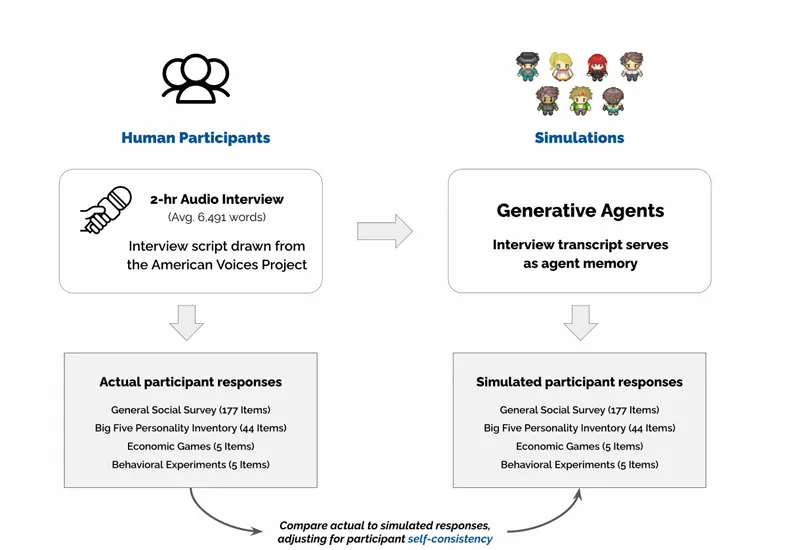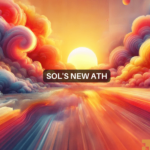Stanford University researchers have developed AI agents that can predict human behavior with remarkable accuracy. A recent study, led by Dr. Joon Sung Park and his team, demonstrates that a two-hour interview provides enough data for AI to replicate human decision-making patterns with 85% normalized accuracy.
Digital clones of a physical person go beyond deepfakes or “low-rank adaptations” known as LoRAs. These accurate representations of personalities could be used to profile users and test their responses to various stimuli, from political campaigns to policy proposals, mood assessments, and even more lifelike versions of current AI avatars.
The research team recruited 1,052 Americans, carefully selected to represent diverse demographics across age, gender, race, region, education, and political ideology. Each participant engaged in a two-hour conversation with an AI interviewer, producing transcripts averaging 6,491 words. The interviews, following a modified version of the American Voices Project protocol, explored participants’ life stories, values, and perspectives on current social issues.
And that’s all you need to be profiled and have a clone.
But unlike other studies, the researchers took a different approach to processing interview data. Instead of simply feeding raw transcripts into their systems, researchers developed an “expert reflection” module. This analysis tool examines each interview through multiple professional lenses—a psychologist’s perspective on personality traits, a behavioral economist’s view of decision-making patterns, a political scientist’s analysis of ideological stances, and a demographic expert’s contextual interpretation.
Once this multi-dimensional analysis is done, the AI is more capable of properly understanding how the subject’s personality works, getting a deeper insight than what could be achieved by simply trying to predict the most likely behavior based on statistics. The result is a group of AI agents powered by GPT-4o with the ability to replicate human behavior on different controlled scenarios

Testing proved remarkably successful. “The generative agents replicate participants’ responses on the General Social Survey 85% as accurately as participants replicate their own answers two weeks later, and perform comparably in predicting personality traits and outcomes in experimental Replications,” the study says. The system showed similar prowess in replicating Big Five personality traits, achieving a correlation of 0.78, and demonstrated significant accuracy in economic decision-making games with a 0.66 normalized correlation. (A correlation coefficient of 1 would indicate a perfect positive correlation.)
Particularly noteworthy was the system’s reduced bias across racial and ideological groups compared to traditional demographic-based approaches—which seems to be a problem for a lot of AI systems, which struggle to find a balance between stereotyping (assuming a subject would exhibit traits of the group it’s included in) and being overly inclusive (avoiding statistical/historical factual assumptions to be politically correct).
“Our architecture reduces accuracy biases across racial and ideological groups compared to agents given demographic descriptions,” the researchers emphasized, suggesting their interview-based method could be very helpful in demographic profiling.
But this is not the first effort to use AI for profiling people.
In Japan, alt Inc.’s CLONEdev platform has been experimenting with personality generation through lifelog data integration. Their system combines advanced language processing with image generation to create digital clones that reflect users’ values and preferences. “Through our P.A.I technology, we’re committed to work towards digitizing the entire human race,” alt In said in an official blog post.

And sometimes you don’t even need a tailored interview. Take MileiGPT for example. An AI researcher from Argentina was able to finetune an open source LLM with thousands of hours of publicly available content and replicate Argentina’s President Javier Milei’s communication patterns and decision-making processes. These advances have led researchers to explore the idea of thinking/sentient ” digital twins,” which technology analysts and experts like Rob Enderle believe could be fully functional in the next 10 years.
And of course, if AI-robots won’t take your jobs, your AI twin probably would. “The emergence of these will need a huge amount of thought and ethical consideration, because a thinking replica of ourselves could be incredibly useful to employers,” Enderle told BBC. “What happens if your company creates a digital twin of you, and says, ‘Hey, you’ve got this digital twin who we pay no salary to, so why are we still employing you?'”
Things may look a little scary. Not only will deepfakes mimic your looks, but AI clones will be able to mimic your decisions based on a short profiling of your behavior. While Stanford’s researchers have made sure to put safeguards in place, it’s clear that the line between human and digital identity is becoming increasingly blurred. And we are already crossing it.
Generally Intelligent Newsletter
A weekly AI journey narrated by Gen, a generative AI model.







